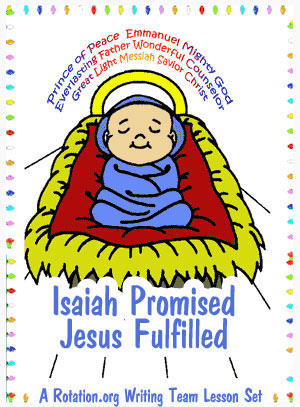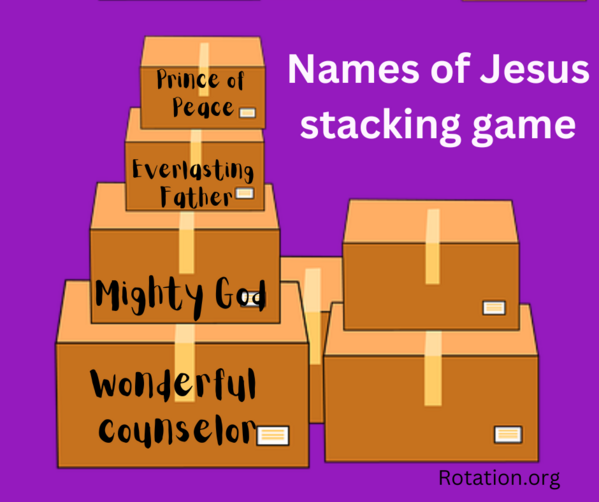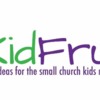Here are two demonstrations with discussion about Isaiah passages (Jesus bringing Light into the world and "God with us") that feel like 'games' that you can 'play' with your students.
1. Flashlight fun: "Darkness/Light"
Isaiah 9:2 "The people who have walked in darkness have seen a great light."
FLASHLIGHT FUN:
Ideally, you will do this demonstration in a totally dark room, if your church has one. If not, use the blindfold option.
Blindfold Option: Students are blindfolded and slowly move around the classroom. Have a spotter-helper.
Use this exercise to begin to unpack the concept of "darkness" as a metaphor for people who have lost their way in life, lost their hope, lost their values, lost their connection to God. (I'm sketching this idea, you will need to flesh it out to your students as you wish.)
Isaiah 9 describes Jerusalem in Isaiah's day. Before you turn off the light, read the whole passage and then turn off the light. Discuss how darkness makes you feel. (It can create anxiety and fear, especially if it's the kind of darkness that has bad things in it, and not simply a dark room!) Ask this question: "If you knew you were in darkness, how exciting would it be to be told that LIGHT WAS COMING! Even if it wasn't going to happen soon, how would it make you feel to know that God was coming to help in a special way?" (You might also point out that some people avoid light even when they see it, while others are drawn to it.)
 Now turn on your bright flashlight in the dark room. What does the light do? How does it make you feel when you see it? What's its purpose? (Remember, this is a metaphor!) The light helped the people "walking" in darkness. How does light help us get where we are going?
Now turn on your bright flashlight in the dark room. What does the light do? How does it make you feel when you see it? What's its purpose? (Remember, this is a metaphor!) The light helped the people "walking" in darkness. How does light help us get where we are going?
For this next part, temporarily turn on the lights...
Now pull out a roll of tinfoil and tear off BIG sheets for each student. Turn off the classroom lights and have them experiment with reflecting the flashlight light using various techniques.
-see how much the room lights up when the flashlight is aimed at one person's foil.
-have students assemble several sheets to see how much light they can reflect.
-have students attempt to 'relay' the beam of light across the room.
Now make the connection between the experiments and experience AND what we know about Christ's light, and our role in reflecting that light to others in darkness.
Final Light Metaphor Option!
Now in that dark room, demonstrate how we know God is with us by his light --even though we don't see God (or at least in the darkened room we only see the flashlight-holder dimly).
We often know and feel God's presence by what God does.... he provides light/wisdom ...a pathway. Growth, warmth, exposing the dark, dispelling fear in the darkness, etc. (all the things that light does). Shine your flashlight on several objects you have placed around the room and relate them to the light Jesus brings and his presence: a Bible, a picture of a person in need, the way out of the room, the light switch, etc. (use your imagination!).
Talk about how God shows us things we need to see. "Now if you close your eyes to God you can't see anything that God is trying to show you." You might think God doesn't exist because you close your eyes to the things God is doing in your life and around you.
 NOTE: you can extend the flashlight activity by having the students decorate the flashlights as a reminder of the lesson, as described here.
NOTE: you can extend the flashlight activity by having the students decorate the flashlights as a reminder of the lesson, as described here.
2. God with Us "20 Questions" Demonstration
Isaiah 7:14 "And you shall call his name Immanuel." (which means, "God with us")
The following exercise demonstrates the idea of someone being 'with us' though not being seen or immediately known, and the ways in which we might be able to tell 'who' is with us. It is meant to create a memorable experience about the word "Immanuel" and open up further discussion.
Prior to class, invite 2 adults to arrive outside the classroom door so that the students cannot see them. You may accomplish this by creating a barrier, or keeping the door closed. Tell the class that they are to try to guess who the first 'guest' is by playing "20 questions." The guest will respond by writing their YES or NO answers on a piece of paper and slipping them to the teacher under the door (or around the blind).
Note: Some questions should be out of bounds, such as, "are you male or female" ...as this will be a problem for the second guest!
After the kids guess who the first guest is, repeat the process with the second guest. However, the second guest is taking on the role of God. This time, tell the students that they are NOT to GUESS OUT LOUD who they think it is behind the door/blind. Instead, they are to keep their opinions to themselves, and when prompted, WRITE DOWN their guess and pass it in.
The teacher should decide how many questions are 'enough' to ask the mystery guest, and when to invite students to submit 'who' they think the guest is. Depending on your age group, the teacher may need to ask specific questions to help students along. Such as "are you famous?" Students may not ask direct questions, such as "are you God?" -because they need to write down their guess.
After 'God' is revealed and enters the room, discuss the process of discovery/questioning that just took place.
When did you start to get an idea of who the person was?
What helped you guess right?
After playing, having the students make a list of GOD'S CHARACTERISTICS
Now write "Jesus" next to "God" and ask students if all those characteristics describe Jesus as well.
Write the phrase "Emmanuel = God With Us" above your two lists.
Additional discussion questions:
Emmanuel, God With Us
Isaiah 7:14 Behold, a virgin shall conceive and bear a Son, and shall call His name Immanuel. (Which means "God with us.")
How is God "with us" today? What does the way God has chosen to be with us tell you about his heart and presence?
Darkness and Light
Isaiah 9:2 The people who walked in darkness have seen a great light;
those who lived in a land of deep darkness, on them light has shined.
What is the darkness people walk in? How is doubt or sin like darkness?
What is the "great light" that God is shining and whom does it shine on?
Wonderful Counselor...Prince of Peace
Isaiah 9: 6
For unto us a Child is born,
Unto us a Son is given;
And the government will be upon His shoulder.
And His name will be called
Wonderful Counselor, Mighty God,
Everlasting Father, Prince of Peace.
Why did the Creator of the Universe decide to become a baby?
What does it mean to say the Child will be a "Counselor" ?? Do you think of Jesus as your counselor? What are some issues and times Jesus could counsel you about?
By the way: Is his name spelled "Immanuel" or "Emmanuel"?
Both spellings are correct!
Writing in Greek, Matthew spelled it with an "E" because that's how the Hebrew words sounds to a Greek speaker --with a long E, and that's how the Greek version of the Old Testament spelled it. But in Hebrew versions of Isaiah, the first letter is an "i" -even though in Hebrew the "i" can sometimes be vocalized like a long E. There is a difference of opinion among translators, so depending on your translation, you might just have Immanuel. But most use Immanuel for Isaiah 7:14 and Emmanuel in Matthew 1:23 when the Greek-writing Matthew is quoting Isaiah.




 NOTE: you can extend the flashlight activity by having the students decorate the flashlights as a reminder of the lesson, as described
NOTE: you can extend the flashlight activity by having the students decorate the flashlights as a reminder of the lesson, as described 





